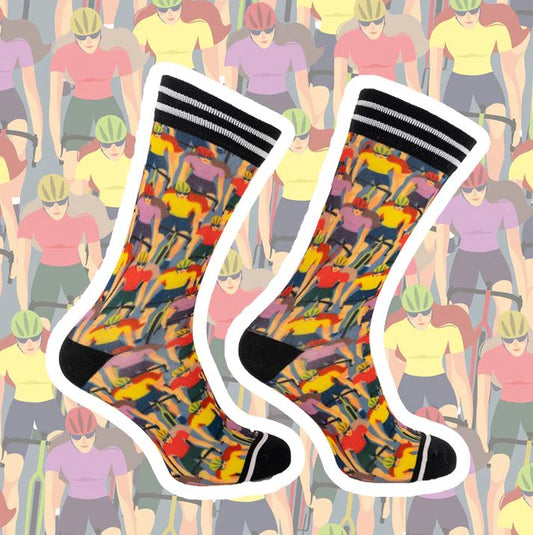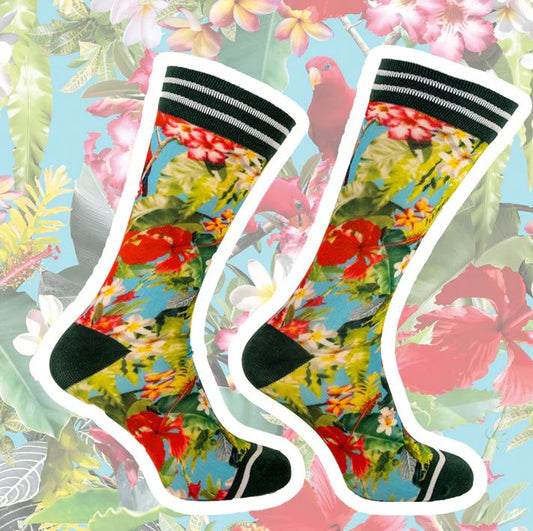What is Egyptian Cotton?
Home / Outfit Man / Socks & Outfit Woman / Socks
Egyptian cotton is known worldwide for its exceptional softness, durability, and luxurious feel. But what makes this material so special compared to other types of cotton? In this blog, we’ll delve deeper into the unique properties of Egyptian cotton, why it’s a great choice for bedding and clothing, and how to ensure you’re getting the best quality. Find out why investing in Egyptian cotton brings a touch of luxury to your everyday life.
What is Egyptian Cotton?
-
Egyptian cotton is one of the types of cotton that exist. Cotton distinguishes itself from other fabrics by its strength, durability and absorbency. It is a fiber that grows from seeds of the cotton plant. Each cotton fiber consists of 20 to 30 layers of cellulose, which are twisted around each other. When a cotton ball opens, the fibers dry into ribbon-shaped threads, which are very suitable for spinning into a fine yarn. So the fibers are spun, which creates threads or yarn. This yarn is then used to weave a fabric, called cotton. The fabric is soft and feels nice on the skin. It is a natural, and therefore not synthetic material, that feels nice and soft on the skin. It is a breathable fabric, which allows air to pass through and is therefore not sweaty. This makes cotton very popular for bedding and clothing.
-
Egyptian cotton is a type of luxury cotton made from a cotton plant that grows in the fertile Nile Valley of Egypt. The ideal growing conditions for Egyptian cotton – a combination of rich soil and warm climate – produce long cotton fibers. This is known as “long staple cotton.” These fibers are much longer than those of regular cotton, resulting in stronger and finer threads. Egyptian cotton is clearly distinguished from other types, due to its extra-long fibers and the purity of the material.
-

Egyptian Cotton: What Makes It So Special?
-
The luxury of Egyptian Cotton
Egyptian cotton is recognized worldwide as one of the highest quality cottons. Known for its exceptional softness, durability, and sheen, it is the fabric of choice for luxury bedding and clothing, including socks . But what makes Egyptian cotton so special? In this article, we’ll explore the unique properties of Egyptian cotton, how it differs from other cotton varieties, and why it’s worth the investment.
-
Unique properties of Egyptian cotton
- Long fibers: The longer the cotton fiber, the stronger the thread and the softer the fabric.
- Strong and durable: Due to the long fibers and the quality of the material, Egyptian cotton lasts longer.
- Absorbency: Egyptian cotton has a high absorbency, meaning it absorbs moisture better, which is essential for comfort in clothing and bedding.
- Shine and softness: Thanks to the fine weave, Egyptian cotton has a natural shine and remains soft, even after many washes.
-
Difference between Egyptian Cotton and Regular Cotton
There are many different types of cotton. Not all cotton is the same, and Egyptian cotton is distinctly different from other types of cotton, which are often mass-produced. Here are some key differences:
- Fiber length: Egyptian cotton has much longer fibers than standard cotton. This means the material is more flexible and wears less quickly.
- Weave Quality: Because the fibers are longer and finer, Egyptian cotton can be woven more tightly, resulting in a smoother, softer surface.
- Longevity: Lower quality cotton often loses its softness quickly and becomes damaged from repeated washing, while Egyptian cotton is known for its longevity and retention of quality.
-
Why invest in Egyptian Cotton?
The higher price of Egyptian cotton can be a reason for some people to hesitate. However, the benefits it offers often justify the investment. Here are a few reasons why it is worth it:
- Sustainability: Egyptian cotton clothing and bedding last for years, recouping the initial cost in the long run.
- Comfort: Due to its breathability and high moisture absorption, Egyptian cotton is ideal for those who value comfort, especially during the warmer months.
- Allergy Friendly: Egyptian cotton is a natural fiber with no chemical treatments, making it an excellent choice for people with sensitive skin or allergies.
-
Egyptian Cotton Care
Egyptian cotton is very strong and durable. But to enjoy this fabric for as long as possible, it is important that it is well maintained. To get the most out of your Egyptian cotton products, good maintenance is essential. There are a number of things you should take into account when washing, ironing and drying. Here are some maintenance tips:
- Use lukewarm water: Wash Egyptian cotton preferably in lukewarm water to maintain its quality.
- Avoid harsh detergents: Use gentle, chemical-free detergents to avoid damaging the fibers.
- Let it dry naturally: Avoid dryers and opt for air drying instead to keep the fibers intact.
-
Washing Egyptian Cotton
You will usually find the washing instructions on the packaging of your purchase. It is wise to follow these washing instructions. It is not a problem if you lose them. With these tips you can safely wash your cotton sheets and clothing. Wash your Egyptian cotton bedding or clothing in cold water. Make sure that zippers or buttons cannot cause damage during washing. It is therefore advisable to wash your bedding and cotton clothing separately from jackets, shirts or other clothing. This prevents damage to the cotton. Do not use chlorine, bleach, fabric softeners or other agents that can damage the Egyptian cotton, because these chemicals can permanently damage the fibers. Finally, it is important to keep in mind that natural fibers, such as Egyptian cotton, can shrink a little during the first wash.
-
Drying and ironing Egyptian cotton
Cotton sheets and clothing are best dried naturally; so hung on a clothesline outside or possibly inside. Egyptian cotton can in principle be put in the dryer, but this will certainly shorten its lifespan. Cotton has no artificial elasticity, because it is not a synthetic fabric, which is why it is naturally wrinkled. This is quite normal. However, Egyptian cotton certainly does not need to be ironed.
-
Bringing the luxury of Egyptian cotton into your home
Egyptian cotton offers undeniable benefits in terms of comfort, durability and luxury. While it may be a higher investment than standard cotton, the long-lasting benefits of this high-quality material offer excellent value for money. Whether you choose Egyptian cotton bedding or clothing, you are buying a product that will last for years and give you that luxurious feeling every day. When purchasing, make sure you look for authenticity and take good care of it to enjoy it for as long as possible.
Discover our socks from the Dutch brand Sock My Feet, made from Egyptian cotton and bamboo
-
Sock My Feet Men's Sock Sock My Vintage Garage
Vendor:Sock My FeetRegular price €12,95Regular price -
Sock My Feet Men's sock Sock My Football
Vendor:Sock My FeetRegular price €12,95Regular price -
Sock My Feet Men's sock Sock My Skull
Vendor:Sock My FeetRegular price €12,95Regular price -
Sock My Feet Men's sock Sock My Cyclist
Vendor:Sock My FeetRegular price €12,95Regular price -
Sock My Feet Men's sock Sock My Boat
Vendor:Sock My FeetRegular price €12,95Regular price -
Sock My Feet Men's Sock Sock My Tropical Birds
Vendor:Sock My FeetRegular price €12,95Regular price
Egyptian Cotton Thread Count: Everything You Need to Know About Thread Count
-
If you’re looking for new bedding, you’ve probably come across the term “thread count.” It’s often used to describe the quality of cotton bedding, but what does it actually mean? And is a higher thread count always better? In this article, we’ll dive deep into the topic of thread count, helping you understand what it actually means, what a good thread count is, and what to look for when choosing bedding.
-
What is Thread Count?
Thread count, or thread density, refers to the number of horizontal (weft) and vertical (warp) threads woven into each square inch of fabric. Simply put, it is the number of threads you can find in a square inch of a piece of fabric. For example, if a fabric has 150 horizontal threads and 150 vertical threads, then the thread count is 300.
The higher the thread count, the more tightly the fabric is woven. This can result in a softer, smoother and firmer fabric, which is also more durable. However, it is important to know that a high thread count does not always guarantee the best quality. -
Why is thread density important?
Thread count is one of many factors that contribute to the comfort, softness, and durability of cotton sheets and bedding. Generally, a higher thread count is thought to indicate a softer fabric that will improve over time. It can also indicate higher quality, as more threads per square inch results in a more tightly woven fabric. But it’s important to note that thread count isn’t the only factor that determines the quality of bedding. The quality of the material itself, the type of weave, and how it’s finished also play a major role.
-
What is a good thread density?
The ideal thread count depends on the type of cotton and the use of the bedding. In general, the following ranges are considered as a guideline:
• 200 to 400 thread count: This is the standard thread count for most cotton sheets and bedding. Sheets in this range are usually lightweight, breathable and comfortable. Percale, which has a simple weave, often falls within this thread count. It is ideal for warmer climates or for people who run hot at night.
• 400 to 600 thread count: This range often offers a good balance of softness, durability and breathability. Sheets in this category often have a more luxurious feel and are heavier than those with a lower thread count. Sateen, which has a softer, smoother texture due to a special weaving process, is often found in this thread count.
• 600 and higher thread count: Sheets with a thread count above 600 can be very soft and tightly woven. However, quality can vary greatly depending on the fiber quality and the weaving techniques used. A thread count above 800 can sometimes be a marketing ploy; the threads are often split or twisted to increase the thread count without actually improving quality. -
Misconceptions about high thread count
There is a common misconception that a higher thread count always equals better quality. While sheets with a high thread count often feel softer, this is not always the case. In some cases, manufacturers split the fibers to achieve a higher thread count. However, this process often results in a fabric that is less durable and wears out more quickly. In addition, a very high thread count can lead to less breathability. This means that the bedding allows less air to pass through, which can lead to a warmer feeling while sleeping. That is why it is important to look not only at the thread count, but also at the type of cotton and the weaving technique.
-
Types of cotton and their influence on thread count
Not all types are created equal, and type can have a big impact on how thread count affects fabric quality. Here are some popular types:
• Egyptian Cotton: This is the highest quality, known for its long, fine fibers that create softer, stronger fabrics. Egyptian cotton sheets can have a thread count of 200 to 800 or higher and tend to feel luxurious. They are durable and get softer with every wash.
• Pima: This is also a high-quality, long-fibered variety, similar to Egyptian cotton. Pima is very soft and durable, and usually has a thread count between 200 and 600.
• Percale: A type of weave often used for bedding. It is lightweight and breathable, with a matte finish. Percale sheets usually have a thread count between 200 and 400, and are ideal for those who like a cool, crisp texture.
• Sateen: A weave that creates a softer, smoother finish by weaving the threads closer together. It often has a higher thread count, from 300 to 600, and provides a luxurious feel. Sateen sheets are generally heavier and have a slightly shiny finish. -
Conclusion
Thread count is an important factor when choosing bedding, but it’s not the only measure of quality. A higher thread count can result in softer, more luxurious sheets, but it’s also essential to consider the type, weave, and finish. By considering these factors and knowing what you’re looking for in bedding, you can make the best choice for a comfortable and durable night’s sleep. So, if you’re looking for high-quality sheets, look beyond the thread count and consciously choose the best material that suits your sleeping preferences. Egyptian cotton is a top choice!
Learn more about socks
-
- Why always wear socks?
- The best warm socks against cold feet
- The best autumn and winter socks
- Why Socks Are the Perfect Gift for Men, and How to Choose Them
- 5 Common Sock Wearing Mistakes, and How to Avoid Them
- How to Match Socks to Your Outfit? Tips for a Stylish Look
- From casual to chic: Socks that complete your look
- What should you pay attention to when buying socks?
- 5 Tips to Prevent Blisters
- Celebrate World Animal Day every day with our animal socks
- How do you keep socks together during washing?
- Give a second life to lonely socks
-
- The 10 Most Common Sock Irritations and How to Fix Them
- What are the best socks against sweaty feet?
- 10 Tips to Prevent Holes in Your Socks
- All about washing and drying socks
- What is Egyptian cotton?
- How often should you change socks?
- How to store socks?
- The Ultimate Guide: How to Choose the Perfect Socks for Every Occasion
- What are seamless socks?
- What is a Flat Toe Seam?
- Top 10 best socks for Father's Day
- What is the best material for socks?








